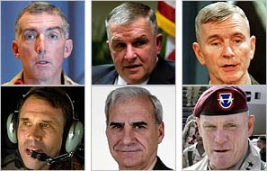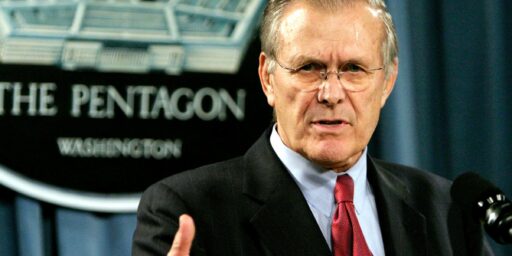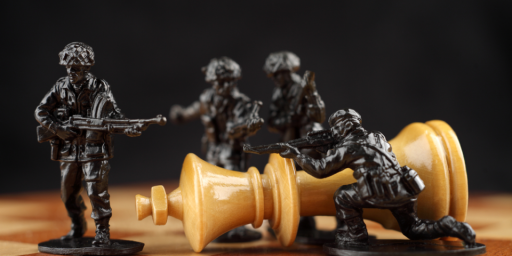Revolt of the Generals?
 That a few retired generals have spoken criticially of SECDEF Donald Rumsfeld continues to gather a surprising amount of attention. The Washington Post‘s lead editorial today is entitled “The Generals’ Revolt” and carries the ominous subhead, “There are many reasons for Donald Rumsfeld to leave. Finger-pointing by retired officers shouldn’t be one.” The nut ‘graph:
That a few retired generals have spoken criticially of SECDEF Donald Rumsfeld continues to gather a surprising amount of attention. The Washington Post‘s lead editorial today is entitled “The Generals’ Revolt” and carries the ominous subhead, “There are many reasons for Donald Rumsfeld to leave. Finger-pointing by retired officers shouldn’t be one.” The nut ‘graph:
The president’s signal failure to hold his defense chief accountable no doubt has helped to produce the extraordinary — and troubling — eruption of public discontent from the retired generals. A couple of those who have spoken out, including retired Marine Gen. Anthony Zinni, former head of U.S. Central Command, opposed the war all along, but three others served in top positions in Iraq.
I should note that these are not mutually exclusive options. Soldiers, including general officers, frequently have misgivings about their assigned missions. They nonetheless salute smartly and carry out their orders. Indeed, that’s what the editorial is about, no?
Much of their analysis strikes us as solid — but the rebellion is problematic nonetheless. It threatens the essential democratic principle of military subordination to civilian control — the more so because a couple of the officers claim they are speaking for some still on active duty.
That, I agree, is problematic. Still, people claim to be speaking for groups all the time. See Jesse Jackson, for example.
Anyone who protested the pushback of uniformed military against President Bill Clinton’s attempt to allow gays to serve ought to also object to generals who criticize the decisions of a president and his defense secretary in wartime.
Actually, those are separate issues. Retired generals are, by definition, not “uniformed military.”
If they are successful in forcing Mr. Rumsfeld’s resignation, they will set an ugly precedent. Will future defense secretaries have to worry about potential rebellions by their brass, and will they start to choose commanders according to calculations of political loyalty?
There has been no rebellion of the brass. John Batiste, who seems to have catalyzed this debate with his call for Rumsfeld’s resignation, reportedly turned down a third star rather than continue to serve under Rumsfeld. Perhaps others also left the service earlier than they might otherwise have for similar reasons. But what brass–i.e., still serving officers of high rank–have spoken out on this issue?
Indeed, it strikes me as far more problematic when serving officers and officials issue leaks to the press to air out their disagreements with administration policy. Now, that undermines the trust of policymakers in their bureaucratic subordinates. Yet, strangely, the WaPo editorial board seems to support that practice.
Tony Blankley has a somewhat more nuanced take on the debate, albeit a prospective one, entitled, “Seven Days in April — Generals Prepare to ‘Revolt’ Against Rumsfeld.”
Consider two hypothetical situations. In the first, a United States Army general officer in a theater of war decides by himself that he strongly disagrees with the orders of the secretary of defense. He resigns his commission, returns to private life and speaks out vigorously against both the policy and the secretary of defense. In example two, the top 100 generals in the Army military chain of command secretly agree amongst themselves to retire and speak out — each one day after the other.
In example one, above, unambiguously, the general has behaved lawfully. In example two, an arguable case could be made that something in the nature of a mutinous sedition has occurred in violation of Article 94 of the Uniform Code of Military Justice procedure. When does an expanded version of the simple honesty and legality of the first example cross over into grounds for a court martial? More specifically, can a series of lawful resignations turn into a mutiny? And if they are agreed upon in advance, have the agreeing generals formed a felonious conspiracy to make a mutiny?
The answer, presumably, is Yes. Still, it seems far-fetched, Richard Holbrooke or no. Frankly, there just aren’t that many generals willing to sacrifice their careers for their beliefs, even if there were a critical mass against Rumsfeld and/or the war. For that matter, even if there were, there are plenty of others where they came from far more highly competent colonels are qualified to wear stars than can be selected under our present system.
E. J. Dionne entitles his contribution “Roots of the Uprising.” It is, in typical Dionne fashion, nonsensical.
It’s amusing to hear the administration’s supporters worry that these courageous former generals are a threat to civilian control of the military. The claim reflects this administration’s willingness to muster any argument it can put its hands on to silence opposition.
But it’s the press making the argument, not the administration. Indeed, administration officials, including the president and Rumsfeld himself, have gone out of their way to defend the right of these men to speak out.
Some smart and patriotic generals are telling us that a policy is not wise or respectful of our troops just because it is put forward by politicians on the right end of our political spectrum. We may be witnessing the weakening of partisanship in the top echelons of the military. That would be very good for our republic.
If it were true, yes. But, while military officers have been more Republican than the society as a whole over the last quarter century or so, it’s about philosophy rather than partisanship. The GOP has been the party in favor of building up the force, raising military pay, buying more high end weapons systems, and the like. It’s hardly surprising that the warrior class would support those positions.
Bucking the trend against the civilian control conventional wisdom, David Broder says we should “Listen to the Brass.”
Rumsfeld and President Bush insist that the manpower and strategy have been exactly what the commanders in the field thought best, but now general after general is speaking out to challenge that claim. The situation cries out for serious congressional oversight and examination; hearings are needed as soon as Congress returns. These charges have to be answered convincingly — or Rumsfeld has to go.
The problem is that, while a handful of retired generals have spoken out, those actually in charge have not. The Chairman of the Joint Chiefs is not only empowered but required by statute to serve as the president’s chief military advisor and give his unvarnished professional opinion, regardless of their harmony with those of the SECDEF. Similarly, all general and flag officers are confirmed by the Senate. When called to testify before Congress, it is their sworn duty to answer truthfully, irrespective of the chain of command.
As Brit Hume implies, some of the pronouncements of the retired generals amounts to good old fashioned CYA.
Former Clinton CENTCOM commander, Anthony Zinni — the most prominent of the retired generals attacking Defense Secretary Donald Rumsfeld — now says that, in the run-up to the war in Iraq, “What bothered me … [was that] I was hearing a depiction of the intelligence that didn’t fit what I knew. There was no solid proof, that I ever saw, that Saddam had WMD.”
But in early 2000, Zinni told Congress “Iraq remains the most significant near-term threat to U.S. interests in the Arabian Gulf region,” adding, “Iraq probably is continuing clandestine nuclear research, [and] retains stocks of chemical and biological munitions … Even if Baghdad reversed its course and surrendered all WMD capabilities, it retains scientific, technical, and industrial infrastructure to replace agents and munitions within weeks or months.”
Further, even if the generals were united and Rumsfeld made decisions that went contrary to their views, so what? We have elections to hold presidents accountable. George W. Bush was re-elected and empowered to decide who he wanted as his SECDEF. As of today, that man is still Rumsfeld. To the extent one thinks Rumsfeld is doing a bad job, the beef is with Bush, not Rumsfeld.
Update: Dean Godson has a scathing piece in the London Times entitled, “Why America’s Generals Are Out For Revenge: The US top brass are ducking their responsibilities – and beleaguered Donald Rumsfeld is just doing his job.”
The generals’ criticisms will certainly strike a chord among critics of the war in Iraq, who contend that neoconservative ideologues at the Pentagon rode roughshod over professional military advice. They particularly alight on the supposed insufficiency of troop numbers sent to Iraq for post-conflict operations and the failure to plan for the insurgency.
What of these charges? Mr Rumsfeld was right in believing that the war itself could be won with a much smaller force than was used in the first Gulf War of 1991, not least because the Iraqi army had halved in size. He was right effectively to send Tommy Franks away with a flea in his ear when the then US commander presented the original war plans, as General Franks has conceded. Pace George Galloway, there was no Stalingrad by the Tigris.
This was no McNamara-style micromanagement of targeting when Pentagon “whiz-kids” constantly encroached upon professional military prerogatives. Rather, Mr Rumsfeld’s big picture approach is exactly what civilian control of the military is supposed to be all about: in other words, asking what would be the price in blood and treasure of a particular plan? Dick Cheney, the Vice-President, did much the same as Defence Secretary in 1990 when he asked Norman Schwarzkopf to revise his plans for a costly frontal assault on the Iraqi forces in Kuwait.
What about the postwar period? General Jack Keane, the Army Vice-Chief of Staff during this critical period, told me that it was just as much the military’s responsibility to anticipate the insurgency, if not more so. “We had no plans for that”, he said. “It was our fault, not Donald Rumsfeld’s.” The point was inadvertently underscored in Franks’s autobiography when he told Pentagon civilians that he would not involve himself in the detailed work on Phase 4 or “stability” operations — that is, after major combat was over. “I’ll do the day of and you’ll do the day after,” he snorted. He also refused to work alongside “Free Iraqis” ready to take up postwar security tasks. All of this cost the US dearly when the looting began in Baghdad. Yet Rumsfeld et al acquiesced.
The real issue in postwar Iraq was less that of numbers than of the mix of forces. The Americans did not need many more GIs who cannot speak Arabic patrolling the streets in heavy body armour; rather, they could have done it with the existing size of force, but with more military policemen, intelligence officers and civil affairs specialists.
[…]
Mr Rumsfeld, by contrast, has had far more success than Kennedy in shaking up the US Army. Until September 11 it was still too much of a garrison force, geared up for Cold War contingencies. Or, in the quip of one of Rumsfeld’s intimates, it was full of “Fulda Gap warriors”, rather than the kind of expeditionary forces required for the War on Terror.
The Defence Secretary has trod on toes in this process. He has insisted on interviewing every appointment to four and three-star rank — something that was more of a pro forma process under his predecessors. He appointed a retired Special Forces general, Peter Schoomaker, as US Army Chief of Staff, thus passing over stacks of serving officers. And with his greater emphasis on high-tech “jointery”, he has forced both the Army and the Marines to depend more on Air Force and Navy supporting fire.
The real criticism of Mr Rumsfeld is not that he “kicked to much butt”, but that he kicked too little. At George Bush’s behest, he sent the US armed forces into a war that they weren’t yet fully ready to fight: they are much more prepared now, but the insurgency genie is out of the bottle. He was part of the Republican consensus that was contemptuous of Clinton-era peacekeeping operations, believing that real soldiers don’t do social workerish stuff. Like so many reformers, his problem is that his changes discomfit existing interest groups before the benefits become fully visible.
This strikes me as largely right. While Bush, Cheney, and Rumsfeld all deserve their share of blame for things that have gone wrong under their watch, those who are career professionals get far too little criticism. Generals spend their careers learning to plan for and fight wars. Foreign Service and Intelligence Officers likewise spend decades learning to do their jobs. They have a responsibility to do their best to carry out the plans of those elected to direct policy.
________
Related:
Outspoken Retired Generals and Civilian Control, Redux
Firing Donald Rumsfeld
Retired Generals Call for Rumsfeld Resignation




I don’t have a dog in this hunt because I don’t have any particular fondness for either Mr. Bush or Mr. Rumsfeld. As far as I’m concerned they’re just a means to an end—prosecuting the War on Terror (or Jihadism or whatever we’re calling it these days). But I think the retired general officers who are putting up the stink are thinking correctly tactically but not thinking correctly strategically. From what I’ve heard they continue to be committed to the Powell Doctrine but haven’t asked the necessary question: could the strategic objectives have been achieved with that kind of overwhelming force?
These fine men continue to be committed to the welfare of their men and the organization they’ve helped to build over the years and we’re grateful for that. But if we’d gone into Afghanistan with the overwhelming force the Powell Doctrine suggests (how? look at a map) we’d have met with a lot more resistance there. How would that have advanced the strategic objective?
Same with Iraq. If we’d put 500,000 men into Iraq (how?) would we have met with more or less resistance there in the aftermath?
Jihadism? Wat a moron you are Dave. Plus, if you live on the planet earth, you do “have a dog in this fight”.
Just admit you are a liberal, Dave. And because of that you hate Bush and his entire admin and will use the war on terror as a political tool for your parties benefit. Why is it liberals can never admit they are liberals? Maybe they think of liberal as a bad word. Wow-they finally got something right!
Christiopher, next time read the whole comment.
It’s very difficult to say if 250k troops would have Iraq in better shape now than 150k. But every competent authority who was willing to take an honest look at the situation knew before we invaded that 150k was definitely _not_ going to accomplish the goal of securing & stabilizing Iraq post-combat. These generals may be thinking tactically, but capturing Saddam was only an operational goal. Stabilizing Iraq is the strategic goal, and not even trying to plan for that (which Tommy Franks himself has said they didn’t) is nothing less than dereliction of duty.
Of course, that brush might be used to paint the generals currently complaining just as easily as Rumsfeld…
“And because of that you hate Bush and his entire admin and will use the war on terror as a political tool for your parties benefit.” Christopher, the only reason you support this incompetent fool is because of his political party. Now lie and tell us you’d support an incompetent Dem Pres too.